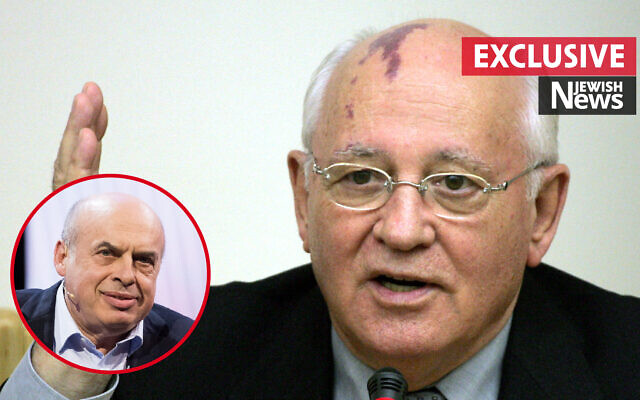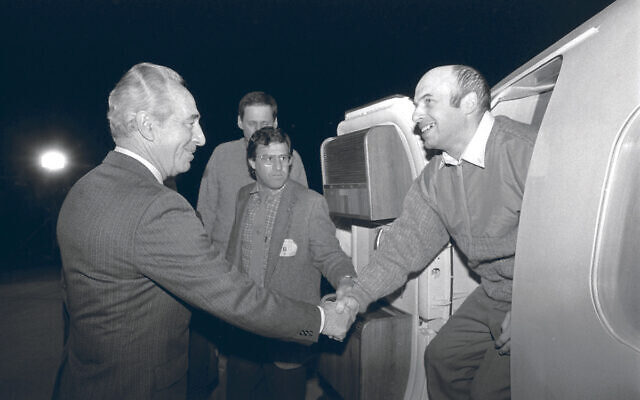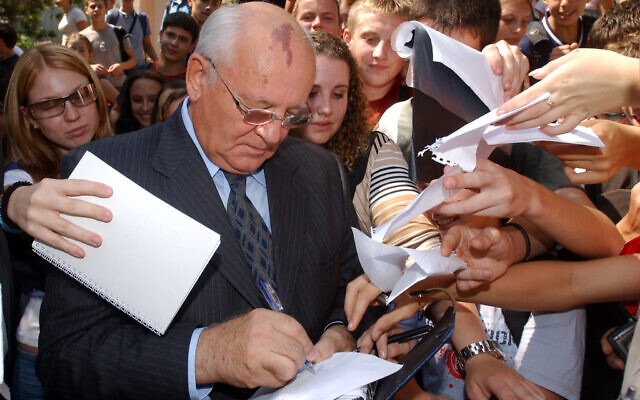Gorbachev didn’t realise there’s no such thing as a little bit of freedom – Sharansky
EXCLUSIVE: Natan Sharansky, the political activist and symbol of the plight of Jews in the USSR, tells Jewish News that the last Soviet leader was a unique phenomenon
Michael Daventry is Jewish News’s foreign and broadcast editor

Mikhail Gorbachev was a “unique phenomenon” who tried to rebuild the Soviet system after reaching its summit – according to the man he released from six years of hard labour.
Natan Sharansky, the political activist who became a symbol of the plight of Soviet Jews persecuted during the 1970s and 80s, praised the last Soviet leader for recognising the need for greater freedoms.
But that also triggered the unravelling of the USSR, a process that Gorbachev – who died in a Moscow hospital this week aged 91 – was unable to stop.
“What he didn’t realise was that there is no such thing as a little bit of freedom,” Sharansky told the Jewish News in the hours after Gorbachev’s death was announced.
“The more people get some freedom, they demand all the freedoms.
“And so the process started which he didn’t want and which he wanted to stop: the disappearing of the Soviet Union.”
Gorbachev was loyal believer in Lenin’s ideas who wanted to give socialism “a more human face”, Sharansky said, and tried “very hard” to stop the collapse – by sending troops to the breakaway Baltic republics, for example – because “he was fighting for something that he believed. He was fighting until the last days because he wanted to keep monopoly of the Communist Party”.
He continued: “So it is really a unique phenomena of a person who is at the top of the pyramid, of the system, and decided to change the system.
“But you have to remember that the real changes that he did were because of the big pressures of the free world and the big crises in which the Soviet Union was.”
Gorbachev became leader in 1985 and is best known in the West for opening up the USSR and rebuilding ties with countries including United States and Britain.

He won the Nobel Peace Prize in 1990 for his role in ending the Cold War.
But he also lifted restrictions preventing Soviet citizens from travelling abroad, prompting Jews in their hundreds of thousands to make aliyah after waiting for many years.
Sharansky was the first political prisoner to be released under Gorbachev’s policy of glasnost – or openness – and went on to emigrate to Israel, where he became a politician and later the chairman of the Jewish Agency.
The two men first men in Israel during a dinner hosted by President Chaim Herzog in 1992 – after Gorbachev’s time as Soviet president had ended.
Sharansky recalled how his wife Avital, who had spent years campaigning against the Soviet Union and even picketing Gorbachev on his overseas visits, had been reluctant to attend.
“My wife was not sure that she really wanted to go because she said that ‘I was so many times at the demonstrations’, but we both went. It was very easy atmosphere. It was nice to talk, especially when you feel that your cause is won,” he said.
But there was a subsequent encounter between the two men a conference in Poland that was more tense, he said.
“I was asked what are the main factors which brought the liberation and my release and the release of political prisoners.
“I said: ‘number one was the struggle of the dissidents within the Soviet Union, like [Andrei] Sakharov; number two was the support of world leaders like Reagan, and number three is Gorbachev coming to power and making the courageous decision’.
“And after I finished I went straight to Gorbachev and say to him ‘thank you’, but he was very insulted. He said: ‘I released you, against all the advice, I released you, and now you put me in the third place.’”

Gorbachev would later express his regret at the Jewish exodus, admitting that Soviet authorities had long persecuted its Jewish population and that society had been infected with antisemitism.
“The poisonous seeds of antisemitism arose even on Soviet soil,” Gorbachev said in 1991, when he was still Soviet leader.
“The Stalinist bureaucracy, publicly decrying antisemitism, in practice used it to isolate the country from the outside world, counting on chauvinism to strengthen its hold.
“The right to emigrate has been granted, but I say frankly that we, society, deeply regret the departure of our countrymen and that the country is losing so many talented, skilled and enterprising citizens.”
The Central Clinical Hospital in Moscow said Gorbachev had died on Tuesday after “a serious and protracted illness”, the Interfax news agency reported, but did not give further details.
He had been in poor health for months and had not publicly commented on Russia’s invasion of Ukraine since it began in February this year.

Thank you for helping to make Jewish News the leading source of news and opinion for the UK Jewish community. Today we're asking for your invaluable help to continue putting our community first in everything we do.
For as little as £5 a month you can help sustain the vital work we do in celebrating and standing up for Jewish life in Britain.
Jewish News holds our community together and keeps us connected. Like a synagogue, it’s where people turn to feel part of something bigger. It also proudly shows the rest of Britain the vibrancy and rich culture of modern Jewish life.
You can make a quick and easy one-off or monthly contribution of £5, £10, £20 or any other sum you’re comfortable with.
100% of your donation will help us continue celebrating our community, in all its dynamic diversity...
Engaging
Being a community platform means so much more than producing a newspaper and website. One of our proudest roles is media partnering with our invaluable charities to amplify the outstanding work they do to help us all.
Celebrating
There’s no shortage of oys in the world but Jewish News takes every opportunity to celebrate the joys too, through projects like Night of Heroes, 40 Under 40 and other compelling countdowns that make the community kvell with pride.
Pioneering
In the first collaboration between media outlets from different faiths, Jewish News worked with British Muslim TV and Church Times to produce a list of young activists leading the way on interfaith understanding.
Campaigning
Royal Mail issued a stamp honouring Holocaust hero Sir Nicholas Winton after a Jewish News campaign attracted more than 100,000 backers. Jewish Newsalso produces special editions of the paper highlighting pressing issues including mental health and Holocaust remembrance.
Easy access
In an age when news is readily accessible, Jewish News provides high-quality content free online and offline, removing any financial barriers to connecting people.
Voice of our community to wider society
The Jewish News team regularly appears on TV, radio and on the pages of the national press to comment on stories about the Jewish community. Easy access to the paper on the streets of London also means Jewish News provides an invaluable window into the community for the country at large.
We hope you agree all this is worth preserving.





















